Why Is There Oil In My Air Filter? (4 Common Causes)
Ever go to change your air filter and notice things look a bit oily? Perhaps you’ve recently purchased a used vehicle and are wondering if there’s a problem lurking under the hood?
Finding engine oil in your air filter isn’t necessarily a bad thing, but could be pointing to a few potential problems. More than likely, the culprit is blow-by.
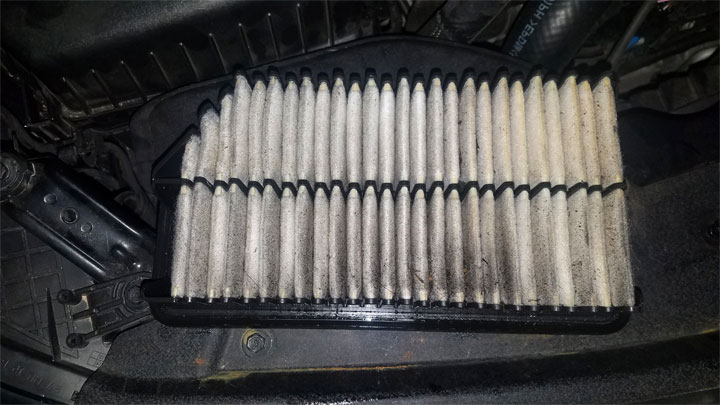
Related: Why is There Oil in My Throttle Body or Intake Manifold?
Common Causes of Oil in an Air Filter
#1 – Clogged Positive Crankcase Ventilation (PCV) Valve
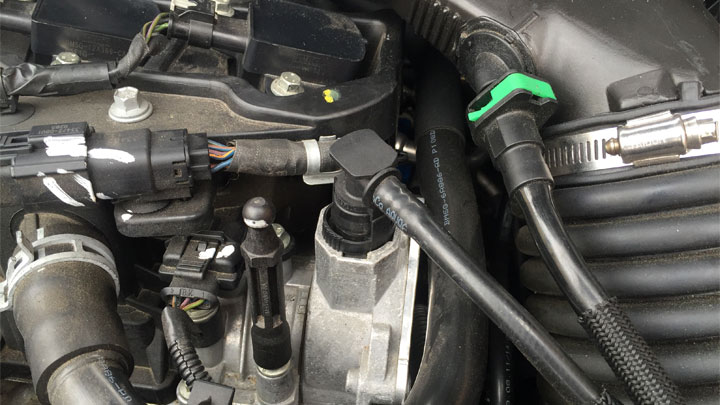
Old cars used to vent blow-by to the atmosphere, but these emissions were harmful to the environment. The positive crankcase ventilation (PCV) valve was introduced as one of the first emissions controls, and redirects blow-by back into the air intake instead of letting it pollute the environment.
A PCV valve needs to be replaced occasionally, just like an oil filter. The positive pressure in the crankcase needs a place to go.
If a PCV valve becomes clogged, blow-by may end up slipping through seals, between gaskets, or any other tiny gaps in the engine it can find. The valve could also be stuck open allowing more oil to enter the intake than intended.
#2 – Worn Piston Rings
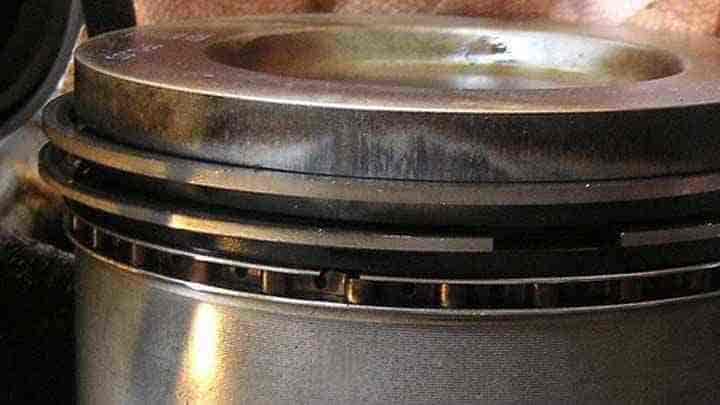
Piston rings provide a seal between the cylinder wall and the piston to maximize the force applied by the combustion of the air-fuel mixture in the combustion chamber. The stronger the force, the more power your car will have.
Over time, piston rings can become worn due to high mileage, improper maintenance, poor engine design, or running the engine hard before it has reached operating temperature.
As a car ages and piston rings wear, you might see horsepower numbers gradually decrease and blow-by gradually increase as the quality of this seal deteriorates.
When the volume of the blow-by starts to increase, you may notice more oil in the air filter housing, possibly extending all the way to the air filter itself.
To diagnose worn piston rings, you can do a compression test on each cylinder to verify the pressure.
Cylinder pressures should be relatively equal across all cylinders, and the factory manual will include the manufacturer’s specification for what the acceptable range for cylinder pressures should be. To replace worn piston rings, an engine rebuild is required.
#3 – Aftermarket Air Filter
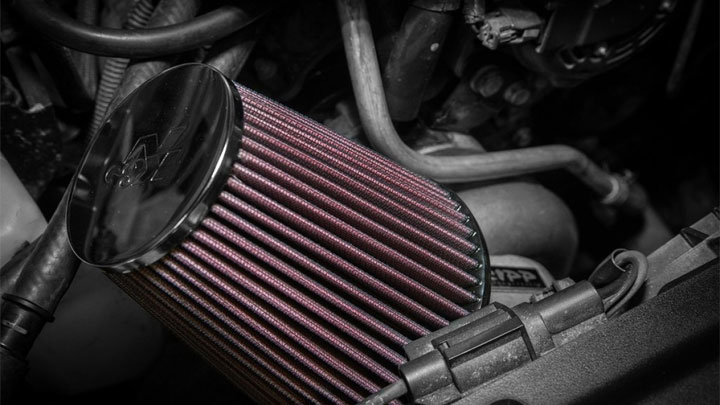
Some aftermarket air filters such as the popular K&N brand (like this) are reusable. These reusable filters require an oily film be applied on the exterior of the filter (the side facing away from the engine) before use.
If you notice oil on the inner side of the air filter, you or a previous owner may have applied too much oil. Follow the filter manufacturer’s recommendations for how to clean and prep the filter before use or reuse.
Related: Is a Cold Air Intake Worth It?
#4 – Clogged Oil Channels
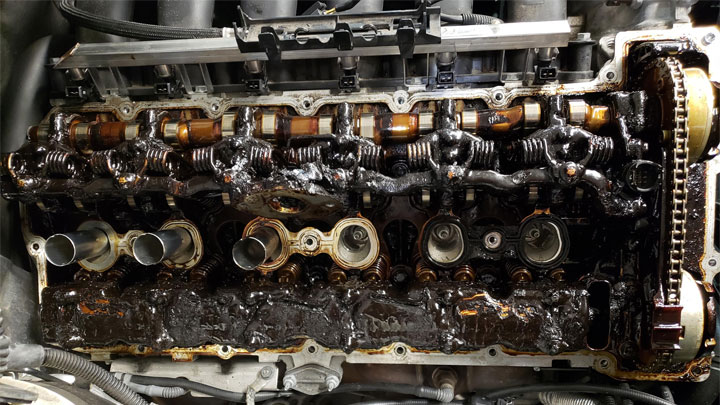
Modern engine oil lasts a very long time, but it doesn’t last forever. When oil change intervals are neglected or forgotten, the old oil will thicken and form a nasty sludge.
This engine sludge can clog oil channels which exist to keep the engine well lubricated and to keep the oil flowing through the engine as designed.
When these channels are blocked, oil and sludge may accumulate in areas of the engine it wasn’t meant to go, including the intake. This may reduce horsepower and fuel economy, and could cause total engine failure if left unchecked for a long period of time.
What Causes Engine Blow-By?
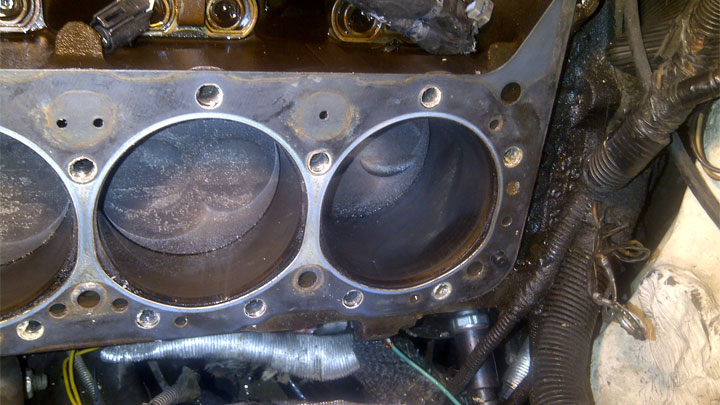
When your engine runs, there is a natural buildup of pressure in the crankcase from air, fuel, and oil slipping past the piston rings. This is known as blow-by.
A little blow-by is completely normal as the piston rings are unable to seal perfectly against the cylinder walls. However, excessive blow-by can cause problems.
Excessive blow-by leads to reduced fuel economy and horsepower numbers, since some of each combustion cycle is wasted venting the mixture into the crankcase and the air intake.
Additionally, blow-by burns differently than pure gasoline and can be hard for sensors to measure, interfering with the air-fuel ratio and effectively lowering the octane rating of your gasoline.
This may cause pre-detonation (also known as knock). Knock can lead to engine damage if it happens regularly or if it occurs when there is a high load on the engine. If your vehicle seems to have excessive blow-by, there are a few likely causes.
Prevention is Key
If you’ve reached the end of this article and are still unsure what is causing there to be oil in the air intake, consider adding a catch can or air oil separator to the vehicle.
These devices are used to collect or filter gases vented from the crankcase which can potentially offer you a cleaner, smoother running engine and extend the life of the vehicle.
Most catch cans and air oil separators are fairly inexpensive and easy to install and provide great peace of mind for a vehicle you plan to keep for a long time.
- Plasti Dip FAQ – How Long Does It Last? (and Other Questions) - May 6, 2020
- Driving With Both Feet? (You’re Doing it Wrong) - Jan 6, 2020
- 16 Reasons Your Car Is Getting Bad Gas Mileage - Oct 28, 2019

Thanks